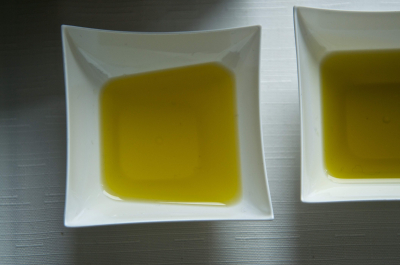The perception of quality
Much has been said about how our knowledge of extra virgin olive oils has increased among its consumers, and consequently, how we are now able to discern their true quality. But is it really so? Perhaps only in part

Nowadays consumers pay greater attention to the products they purchase, and their raised awareness is partly due to the countless knowledge-promoting actions and events that take place almost everywhere. Another undisputable fact is the higher quality of the oils now sold. The production techniques have improved, together with the farmers’ efforts to supply olives meeting adequate quality standards. The consumer’s perception of quality has also grown, with a consequent increase in the consumption of extra virgin olive oil. Some doubts however persist.
Oil culture. It should be more profound, because even though our overall knowledge of oil has increased over these last few years, it is by no means sufficient. Generally speaking, oil producers don’t read: they tend not to have books on olive oil, because either they believe that they know everything on the subject, or have no interest in having a private collection of books on olives, olive cultivation and oil.
Likewise, consumers and professional tasters avoid deeper studies, although this does not occur in other countries.
Quality. We have succeeded in passing from the production of lampante oil, the quality of which is extremely low, to extra virgin olive oil. This however is not enough, we must aim at excellence:
– first of all, because the current trend is to consume less fats in our diet, but of a greater nutritional and organoleptic quality: in other words, they must taste better, and be more beneficial for our health;
– secondly, because only by striving to produce an oil of outstanding quality it will be possible to face the fierce competition of other countries. This however is not enough, the current challenge is to make quality more democratic, more accessible, reducing its price.
The perception of quality. This aspect has greatly evolved over the last two decades: despite the many steps forward, there are still a number of “buts”. Many believe that an extra virgin olive oil, just because it is such, is a product of quality, but this is not always true. The consumer must learn that there are different degrees of quality. There is the “juridical” quality, established by law, and there is a more objective quality, which can be assessed by a panel of professional tasters. What is lacking in the oil sector is the will to teach the exact meaning of quality, as well as the features of all the oils produced in different parts of our country. If not in very rare cases, this latter aspect has never been properly dealt with by the many consortiums present on the territory that should be in charge of promoting their PDO (Protected Designation of Origin) extra virgin olive oils. The knowledge of their differences would allow us to understand and appreciate the true goodness of oils typical of a certain zone, with no prejudice.
The consumers instead – and sadly, I would like to add – continue to prefer oils with a standard sensory profile, that is to say those that are sweet to the palate, and have little or no bitterness or pungency. They still tend to confuse these latter traits with acidity, and therefore consider them a defect, ignoring their importance in highlighting the freshness and goodness of the oil. The road to the true understanding and appreciation of oil is still long, and much remains to be done. In Spain for instance, even olive farmers tend to purchase and use plain olive oil instead of the extra virgin, though the quality of the two products cannot be compared. Yet this is a common practice, and goes to show that we still have much to learn about olive oil. In some areas of Italy, on the other hand, lampante oil is still produced, using olives picked from the ground, and therefore overripe and often bruised and damaged. It is consumed because it is preferred to good-quality oil, since it is sweeter. The locals are used to the flavour, and habit strongly affects the way quality is perceived. In brief, much remains to be done, but luckily, if one wishes to know more about olive oil and its quality, there are many books to choose from.
Let us never forget that the consumers must always be satisfied. If they want sweet oil, we should give them sweet oil, but at the same time, gently steer them towards oils of greater quality, so that they can learn to appreciate their bitterness and piquancy. This journey to the discovery of excellence may take some time, but nobody should be hurried or forced. It is worth mentioning that delicate oils, leaving a sweet sensation in the mouth are by no means inferior. “Sweetness”, a feature indicating a lower perception of bitterness is not a negative trait. The challenge today is to obtain oil that at first tastes sweet, and then progressively discloses a harmonious and well balanced combination of bitterness and pungency.
Quality and the perception of quality: this is our latest challenge. Quality that is not perceived as such finds no space on the market.
Photo by Alberto Martelli
To comment you have to register
If you're already registered you can click here to access your account
or click here to create a new account


Comment this news